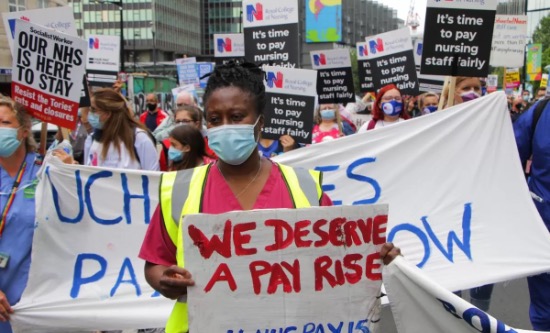
As the Health Secretary Sajid Javid crassly tells us not to ‘cower’ before Covid-19, the true cost of the pandemic for those needing treatment for other conditions becomes more evident. Between April 2020 and May 2021, the British Medical Association (BMA) estimates that 3.63 million fewer elective procedures took place and 23.67 million fewer outpatient appointments. In June, 1.73 million people were waiting over 18 weeks for treatment and 336,733 people were waiting over a year. The overall reported waiting list is 4.59 million people. These waiting times are 13 times higher than in May 2020 and 326 times higher than in May 2019.
In June 2021, the number of people spending over 12 hours in corridors on trolley beds waiting for admission to a ward, reached 1,289, up from 462 in June 2019. Alongside this, there are more people waiting over four hours in A&E. With respect to people with cancer, the 93% target for someone to be seen by a specialist consultant within two weeks of an urgent GP referral has not been met since May 2020.
Recent analysis by the Royal College of Emergency Medicine suggests that the NHS in England needs another 16,000 beds to meet the expected winter demand. There are currently record levels of A&E attendances in both adult and children’s departments and wards will not be able to cope with potential admissions if this persists. This would mean longer waiting times in A&E, more treatment in cubicles and corridors adding to hospital-acquired infection risks, and further numbers of people added to the elective backlog, as beds are taken up by emergency admissions. All this is going to be made worse as the number of hospitalised Covid-19 patients exceeds 5,000, six times the level at the end of May.
Staff shortages worsen
All this requires additional staff and the will to organise. However, the NHS is struggling just to have enough staff to keep abreast of current care. The Royal College of Nursing has been campaigning to have England’s Health Bill amended to include the Health Secretary being accountable for staff shortages. Since 2016, the government has ignored workforce warnings 21 times. At the start of the pandemic, there were almost 50,000 nursing vacancies in Britain, but the true shortage is not known. The pay offer from the government for nurses was an insulting 1%. Nursing bodies asked for 15%; the pay review body has offered 3% with the government saying that the balance over 1% will have to come from the existing NHS budget. The stress of caring for Covid-19 patients has been such that many nurses are leaving the NHS; they have experienced an effective pay cut over the last 10 years of 7%.
Meanwhile BMA data suggests that there is a shortage of 49,162 full time equivalent doctors and that if nothing is done this could hit 83,779 by 2043. The facts are that Britain deliberately trains fewer doctors and nurses than it needs and makes up the difference through recruitment from impoverished countries. For example, Britain gives money to Ghana to fight malaria and reduce infant mortality. But this aid is dwarfed by savings of £65m by Britain employing 293 doctors trained in Ghana, and £35m by employing 1,021 Ghanaian nurses. In 2017, then Health Secretary Jeremy Hunt estimated that Britain trained 6,500 doctors per year but needs about 8,000. His worry about recruiting from abroad was that there may not be enough for Britain. In 2005, the cost of training a doctor was £220,000 and a nurse £125,000.
Even with this poaching, Britain has 2.8 doctors per 1,000 people while the EU average is 3.5. In 2021, of the 289,000 doctors licensed to practise in Britain, nearly one third were trained abroad, with the largest numbers coming from India, Pakistan, Nigeria, Sudan, South Africa and Ghana. During the pandemic, Britain has eased visa restrictions and stepped up active recruitment so that the number of doctors trained abroad but licensed to practice in Britain has risen from 66,000 to 80,000, further destroying health care systems in the most oppressed nations. In the Philippines, doctors are retraining as nurses to emigrate and hospital wards are shutting down.
Covid-19 – no vaccinations for the poor
A quarter of people in the imperialist countries have had a vaccine, but fewer than one in 500 in poorer nations. Boris Johnson at the G7 summit pledged surplus vaccines to the rest of the world and promised that wealthy nations would vaccinate the world by the end of 2021. The reality is very different. The G7 committed to giving one billion vaccines in the next year, ten billion short of what is needed. Africa is seeing Covid cases rise by 25%; to vaccinate 10% of the most vulnerable people would need 225 million vaccine doses. Britain offered five million, 2% of what is required. Sub-Saharan Africa has fewer than 1% of the near-billion fully vaccinated people in the world. Oxfam has calculated it will take 57 years for the world to be vaccinated at the rate the underdeveloped countries are currently receiving vaccination. Britain has also blocked efforts to waive patents that would allow global vaccine production. Over 100 former prime ministers and presidents wrote to the G7 saying they needed £48bn for low-income countries for Covid vaccines – just £5m was offered.
Hannah Caller




